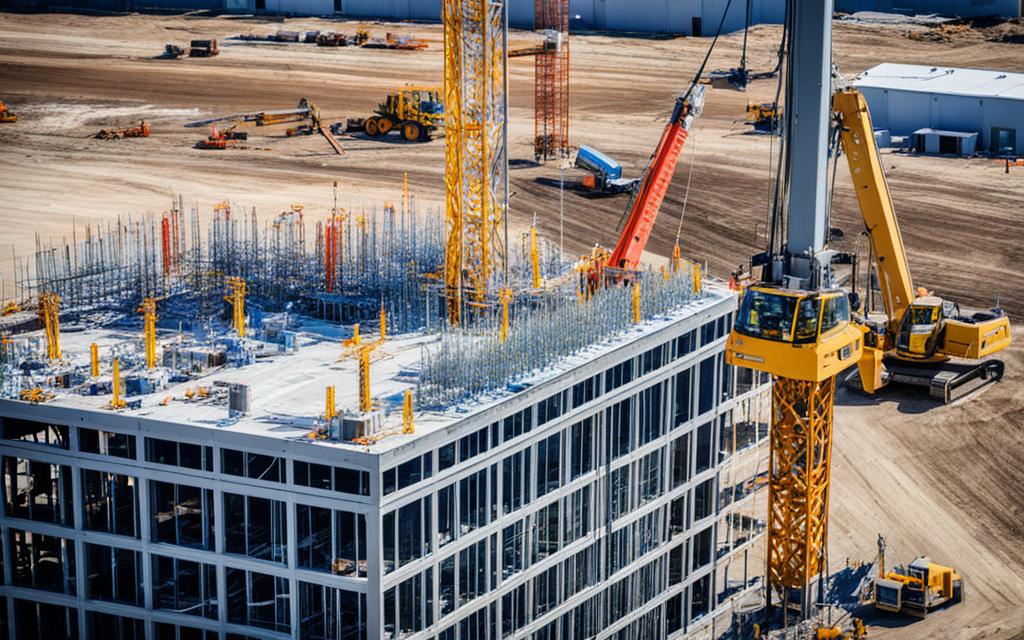In today’s digital age, having a reliable and fast internet connection is crucial for communication, productivity, and entertainment. Behind the scenes, a complex network of infrastructure supports our connectivity needs. This network, known as cellular network infrastructure, is responsible for the transmission of data and signals that enable us to stay connected.
The construction of telecommunications infrastructure is an essential element of building a robust cellular network. As the demand for faster and more reliable internet services continues to grow, the telecom tower construction industry has evolved to meet these needs. With the introduction of 5G technology, network infrastructures have become more sophisticated and dense, paving the way for improved connectivity and enhanced user experiences.
Key players in the telecom tower construction industry specialize in various aspects of network infrastructure and telecommunications services. These companies play a vital role in expanding global connectivity and ensuring seamless communication across the world. From tower construction and installation to the deployment of cutting-edge technologies, these players bring expertise and innovation to the table.
Technological advancements have further revolutionized telecom construction, resulting in improved network efficiency and optimization. Advanced antennas and smart towers are changing the landscape of telecom networks, allowing for better signal coverage and increased capacity. Integration with Internet of Things (IoT) devices and cloud services adds another layer of functionality, creating a network ecosystem that enhances connectivity and enables new applications.
However, telecom construction also faces challenges. Navigating complex regulations and addressing environmental concerns are crucial considerations in building network infrastructure. Fortunately, innovative solutions such as using sustainable materials and adopting efficient construction management practices are being implemented to mitigate these challenges.
To ensure the successful completion of telecom construction projects, effective project management is crucial. Precise planning, execution, and the use of advanced project management tools are essential for delivering projects on time, within budget, and according to specifications.
In conclusion, understanding cellular network infrastructure and the construction process that supports it is essential in a digitally connected world. As technology continues to evolve, telecom construction will play a significant role in bridging the digital divide and shaping a connected and inclusive future.
Evolution of Telecom Tower Construction
Telecom tower construction has undergone a significant transformation, evolving from basic network infrastructure to more advanced and dense structures. With the introduction of 5G technology, the demand for upgrades and optimization of existing network infrastructures has increased exponentially. This shift towards 5G has presented both unique challenges and exciting opportunities in the telecommunications industry.
The rapid advancement of technology has necessitated the construction of telecom towers that can support the increased data transfer rates and connectivity requirements. These towers are designed to accommodate the growing number of antennas and equipment necessary for seamless 5G communication. As a result, telecom tower construction has become more intricate and specialized, requiring expertise in cutting-edge technologies and network optimization.
To provide a visual representation of the evolution of telecom tower construction, here is a comparison between traditional and modern telecom tower designs:
| Traditional Tower Construction | Modern Tower Construction |
|---|---|
| Single mast design | Multiple mast design to support numerous antennas |
| Basic support structure | Reinforced structure capable of handling heavier equipment |
| Lower height to cover limited area | Taller height to ensure wider coverage and higher capacity |
| Limited capacity for network expansion | Able to accommodate future technology advancements and increasing demand |
As telecom tower construction continues to advance, it plays a vital role in enabling efficient and reliable network connectivity. The integration of 5G technology and the ongoing evolution of network infrastructure contribute to the development of a more connected world.
Stay tuned for the next section, where we’ll explore the key players in the telecom tower construction industry and their contributions to network infrastructure.
Key Players in Telecom Tower Construction
In the global telecom tower construction market, a few key players dominate the industry, driving global network expansion and digital connectivity. These companies specialize in various aspects of network infrastructure and telecommunications services, playing a critical role in building and maintaining the backbone of digital connectivity.
“The telecom tower construction market is highly competitive, with key players constantly striving to innovate and deliver cutting-edge solutions that meet the evolving demands of the telecommunications industry.”
These key players have extensive experience in constructing and deploying telecom towers, ensuring optimal coverage and connectivity. They possess a deep understanding of the complex network requirements, regulatory frameworks, and environmental considerations involved in telecom tower construction.
Through their expertise and strategic partnerships, these key players contribute to the seamless integration of various telecom services, including voice, data, and multimedia content. By leveraging advanced technologies and industry best practices, they provide robust network infrastructure that supports the increasing demands of the digital age.
Moreover, these key players have a strong commitment to sustainability, incorporating eco-friendly practices in their construction processes. They prioritize the use of sustainable materials, energy-efficient designs, and environmentally conscious approaches to minimize the ecological impact of telecom tower construction.
Their comprehensive services encompass site selection, tower installation, maintenance, and ongoing technical support. They are trusted partners for telecom operators, governments, and other stakeholders, ensuring the successful implementation of large-scale telecom infrastructure projects.
By continually pushing the boundaries of innovation and delivering high-quality solutions, these key players drive the advancement of cellular network infrastructure and contribute to the connected world we live in today.

Technologies and Trends in Telecom Construction
Advanced antennas and smart towers are revolutionizing the operation of telecom networks. With the introduction of 5G technology, the demand for faster and more efficient connectivity has grown exponentially. Telecom construction companies are leveraging cutting-edge technologies to meet these demands and optimize network infrastructures.
Integration with IoT (Internet of Things) and cloud services is playing a significant role in enhancing network efficiency and optimization. By seamlessly connecting devices and leveraging cloud-based platforms, telecom networks can handle larger amounts of data and provide improved services.
One of the key future trends in telecom infrastructure is the further integration with digital technologies. This integration aims to improve connectivity and expand network capabilities. For example, the implementation of edge computing enables data processing closer to the source, reducing latency and enhancing the user experience.
“The convergence of telecommunications and digital technologies is driving the transformation of network infrastructure. The future of telecom construction lies in its ability to innovate and adapt to emerging trends,” says John Davis, CEO of TeleNet Construction.
To illustrate the impact of advanced technologies in telecom construction, let’s take a look at some key trends:
Emerging Technologies in Telecom Construction
| Technology | Description |
|---|---|
| Small Cells | Compact wireless transmitters that enhance network coverage and capacity in densely populated areas. |
| Virtualization | Replacing physical network elements with software-based solutions, reducing costs and increasing flexibility. |
| Massive MIMO | Multiple Input Multiple Output technology that improves network performance by utilizing multiple antennas. |
| Fiber Optics | High-speed data transmission through fiber optic cables, enabling faster and more reliable connections. |
These technologies are reshaping the telecom construction landscape, paving the way for enhanced network capabilities and improved user experiences. As the demand for digital connectivity continues to grow, telecom construction companies will play a crucial role in building and maintaining the infrastructure needed to support these advancements.
Challenges and Solutions in Telecom Construction
Telecom construction is a complex and ever-evolving industry that faces various challenges. These challenges range from navigating complex regulations to addressing environmental concerns. However, innovative solutions have emerged to overcome these obstacles and ensure timely and cost-effective completion of telecom construction projects.
Regulatory Challenges
The telecommunications industry is governed by a plethora of regulations, which can pose significant challenges during the construction process. These regulations vary from country to country and often require telecom construction companies to navigate a complex web of permits, licenses, and compliance measures. Failure to comply with these regulations can result in costly delays and penalties.
“Navigating the regulatory landscape of telecom construction requires expertise and meticulous attention to detail. By partnering with experienced consultants and legal professionals, telecom construction companies can ensure compliance and streamline the approval process.”
Environmental Concerns
Telecom construction projects often raise environmental concerns, particularly in relation to the installation of cell towers in sensitive areas. These concerns range from potential habitat disruption to visual impact on landscapes. Addressing these concerns is crucial to maintaining a balance between connectivity and environmental conservation.
“Telecom construction companies are increasingly adopting sustainable practices to minimize their environmental footprint. Using eco-friendly materials, implementing efficient waste management strategies, and considering alternative tower designs are some of the solutions employed to mitigate environmental impact.”
Efficient Project Management
Optimizing project execution is vital for the successful completion of telecom construction projects. With numerous stakeholders involved and complex timelines to manage, efficient project management plays a critical role in ensuring projects are delivered on time and within budget.
“Implementing advanced project management tools and techniques is essential for telecom construction companies to streamline workflows and improve project efficiency. By leveraging technologies such as advanced scheduling software and real-time communication platforms, project managers can effectively coordinate resources, track progress, and mitigate potential delays.”
By proactively addressing these challenges through innovative solutions, the telecom construction industry can continue to expand network infrastructure, enhance digital connectivity, and meet the increasing demands of the digital era.
| Challenges | Solutions |
|---|---|
| Complex regulatory landscape | Partnering with legal professionals and consultants to ensure compliance |
| Environmental concerns | Adopting sustainable materials and practices to minimize environmental impact |
| Inefficient project management | Implementing advanced project management tools and techniques |
Project Management in Telecom Construction
Effective project management is essential for the successful completion of telecom construction projects within the telecommunications industry. It ensures that projects are delivered on time, within budget, and according to the specified requirements. Precise planning and execution, coupled with the utilization of advanced project management tools, play a vital role in achieving these objectives.
“Good project management is not only about meeting the project’s objectives, but also about understanding the project’s complexities and unique challenges. It involves the integration and coordination of various activities, stakeholders, and resources to achieve a common goal.”
Telecom construction projects often involve intricate network infrastructure setups, requiring meticulous attention to detail and a structured approach. Project managers must have a deep understanding of the telecom industry, technical expertise, and excellent leadership skills to navigate through potential obstacles successfully.
The use of advanced project management tools and software facilitates efficient project planning, scheduling, resource allocation, and risk management. These tools provide real-time visibility into project progress, enabling project managers to proactively identify and address any issues that may arise.
In telecom construction projects, project managers are responsible for coordinating various teams, including design, engineering, procurement, and construction. Their role includes ensuring effective communication, monitoring progress, managing stakeholders’ expectations, and mitigating risks.
Several case studies have highlighted the importance of project management in telecom construction. These studies demonstrate that well-executed project management processes significantly contribute to the timely completion of complex projects. By employing project management methodologies, telecom companies can optimize project execution and deliver a high-quality infrastructure that meets industry standards.
Case Study: Successful Project Management in Fiber Optic Network Deployment
In a recent project to deploy a fiber optic network in a metropolitan area, effective project management played a crucial role in achieving project success. The project involved multiple stakeholders, including telecom operators, contractors, and local authorities.
The project management team meticulously planned the project, considering factors such as network architecture, equipment procurement, and fiber optic cable installation. They utilized project management software to track progress, manage resource allocation, and monitor budgetary constraints.
Regular communication and collaboration with all stakeholders ensured a seamless execution of the project. Project managers held regular meetings, provided timely updates, and addressed any concerns or issues promptly. This proactive approach helped maintain strong partnerships and foster a collaborative working environment.
Through effective project management, the fiber optic network deployment project was completed on schedule, within budget, and to the satisfaction of all parties involved. The successful execution of this project has paved the way for enhanced connectivity, enabling faster internet speeds and improved digital services for the community.
Project Management Best Practices in Telecom Construction
To achieve success in telecom construction projects, project managers should adhere to the following best practices:
- Develop a detailed project plan outlining the project scope, deliverables, milestones, and timeline.
- Utilize project management software for efficient planning, scheduling, and resource allocation.
- Establish clear communication channels to ensure effective collaboration among project teams and stakeholders.
- Regularly monitor and track project progress, promptly addressing any deviations from the plan.
- Anticipate and mitigate potential risks and issues proactively.
- Adapt and adjust project plans as necessary to accommodate changing requirements or circumstances.
- Ensure compliance with regulatory and environmental requirements throughout the project lifecycle.
The integration of these best practices into telecom construction projects ensures enhanced project outcomes, minimized risks, and increased customer satisfaction.

| Benefits of Effective Project Management in Telecom Construction | Challenges in Project Management |
|---|---|
|
|
Conclusion
As the world becomes increasingly interconnected, the role of telecom construction in building the backbone of cellular network infrastructure has never been more crucial. The ongoing evolution of digital technology means that telecom construction must continually adapt to meet the demands of faster and more reliable internet services.
Telecom construction plays a vital role in bridging the digital divide and shaping a connected and digitally inclusive future. By constructing and optimizing network infrastructures, telecom construction companies pave the way for enhanced digital connectivity and improved communication worldwide.
With technological advancements driving the demand for digital connectivity, the telecom construction industry is poised for continued growth and innovation. From the deployment of advanced antennas and smart towers to the integration of IoT and cloud services, the future of telecom construction is set to transform the way we communicate.
As the world becomes increasingly reliant on digital infrastructure, the importance of effective project management cannot be understated. By employing precise planning, efficient execution, and advanced project management tools, telecom construction projects can be completed on time, within budget, and according to specifications.
FAQ
What is cellular network infrastructure?
Cellular network infrastructure refers to the physical, hardware, and software components that are essential for the functioning of mobile communication networks. It includes cellular towers, antennas, switches, routers, and other equipment that enable the transmission and reception of voice and data signals.
How has telecom tower construction evolved?
Telecom tower construction has evolved with the introduction of 5G technology. The shift to 5G requires more sophisticated and dense network infrastructures, leading to the installation of advanced antennas and smart towers for improved network efficiency and optimization.
Who are the key players in telecom tower construction?
The telecom tower construction industry involves several key players who specialize in various aspects of network infrastructure and telecommunications services. These companies play a critical role in driving global network expansion and digital connectivity.
What are the technologies and trends in telecom construction?
The telecom construction industry is witnessing advancements in technologies such as IoT integration and cloud services. These technologies enhance network efficiency and optimization. Future trends in telecom infrastructure focus on further integration with digital technologies to improve connectivity and expand network capabilities.
What are the challenges and solutions in telecom construction?
Telecom construction faces challenges such as navigating complex regulations and addressing environmental concerns. Innovative solutions include using sustainable materials and adopting efficient construction management practices to minimize environmental impact and ensure compliance with regulations.
Why is project management important in telecom construction?
Effective project management is crucial for completing telecom construction projects on time, within budget, and according to specifications. Precise planning, execution, and the use of advanced project management tools are key to successful project completion.
How does telecom construction contribute to digital connectivity?
Telecom construction plays a crucial role in bridging the digital divide and shaping a connected and digitally inclusive future. By building and upgrading network infrastructures, the industry supports the increasing demand for faster and more reliable internet services, driving digital connectivity worldwide.



















